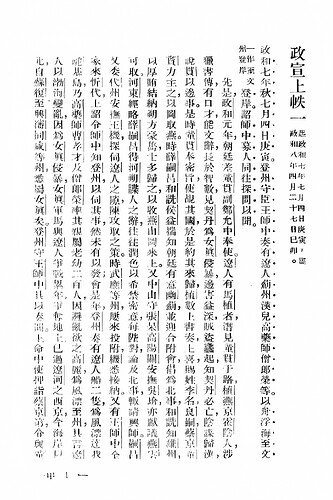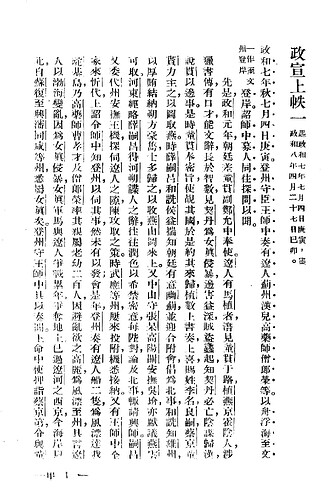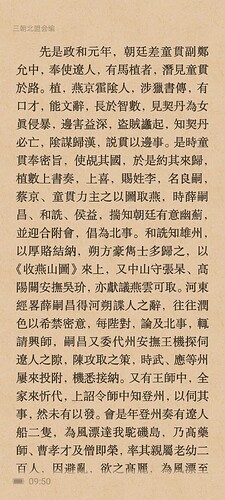看了一下,跟这个是一个东西,就是把图片分辨率放大,我用过,对于不清晰的图片,效果不是很理想。可以看看这个,跟这个原理应该是一样的 https://bigjpg.com/
我用bigjpg与 SourceBook分别处理了一张图片,效果如下,可以看到 SourceBook略好一些,可能是因为 SourceBook的模型专门针对文字图片把,bigjpg侧重于非文字图片:
bigjpg:
SourceBook
都是放大四倍,
原图:
这是原文字:
以上供大家参考
对mdx格式来说,图片格式是在没有资源的情况下无可奈何的选择,文本格式才是王道,所以我们要感谢阿弥陀佛的制作,他制作的绝大部分词典是文本格式的。
是的,要是有文本版的就好了
请问第三步的小程序可以共享使用吗?批量制作词头。
度盘,有个DJVU格式,可能清晰些
1 个赞
这个也就几行代码,写的太简单了,简单到拿不出手。既然想要我就贴出来吧,献丑了:
使用前安装opencc,执行:
pip install opencc
import re
import opencc
converter = opencc.OpenCC('t2s.json')
def convert_mdx():
with open(r'E:\dowload\史记辞典-index.txt', 'r', encoding='utf-8') as f:
with open('E:\dowload\史记辞典.txt', 'w', encoding='utf-8') as fw:
lines = f.readlines()
mapping = dict()
for line in lines:
line = line.strip()
if not line:
continue
mt = re.search(r'(\d+)', line)
if mt:
index = mt.start(1)
headword = line[:index].strip()
pic_num = mt.group(1)
mapping[pic_num] = headword
for line in lines:
line = line.strip()
if not line:
continue
mt = re.search(r'(\d+)', line)
if mt:
index = mt.start(1)
headword = line[:index].strip()
pic_num = mt.group(1)
last_href = ''
prev_num = str(int(pic_num) - 1)
if prev_num in mapping:
last_headword = mapping[prev_num]
if last_headword:
last_href = f'<a href="entry://{last_headword}">上一页</a>'
next_href = ''
next_num = str(int(pic_num) + 1)
if next_num in mapping:
next_headword = mapping[next_num]
if next_headword:
next_href = f'<a href="entry://{next_headword}">下一页</a>'
fw.write("""%s
<img src="/%s.png" width="1080px"><br/><br/><center>%s %s</center>
</>
""" % (headword, pic_num.rjust(6, '0'), last_href, next_href))
simple_word = converter.convert(headword)
if simple_word != headword:
fw.write(f"""{simple_word}
@@@LINK={headword}
</>
""")
else:
print('该行不合法:' + line)
# 生成magic命令
def gen_cmds():
with open('E:\dowload\cmds.txt', 'w', encoding='utf-8') as f:
for i in range(854):
png_name = str(i + 1).rjust(6, '0')
cmd = f'magick {png_name}.png -crop +200+150 -crop -142-386 +repage -strip output/{png_name}.png\n'
f.write(cmd)
convert_mdx()
1 个赞
谢谢分享,确实比我这个pdg更清晰,等我有空了替换一下mdd文件
希望提供一下第四步切图的一些相关工具和批命令。多谢
magic命令安装这个软件就可以了
1 个赞
上边crop就是裁剪的意思,四个值分别是
左,上,右,下的偏移量,他的坐标大概是以图片左上角是原点,+200代表往右移动200个像素,负数相反
已经校对好了。
汉书辞典.txt (341.0 KB)
2 个赞
我不知道你这张图是哪一本书的?
看错了,以为是《史记辞典》。
所以,配套这个电子辞典,最好有原来的这个电子版一起看,是不是好些?能否提供一下这个_10324703.uvz文件呢?
籍合网有文本版,现在只缺少一个账号。
三国志辞典我来校对。
1 个赞
汉书辞典.djv…等2个文件
链接:https://pan.baidu.com/s/1rHveoe-veIoAbPEQ1DBbyA
提取码:uizg






